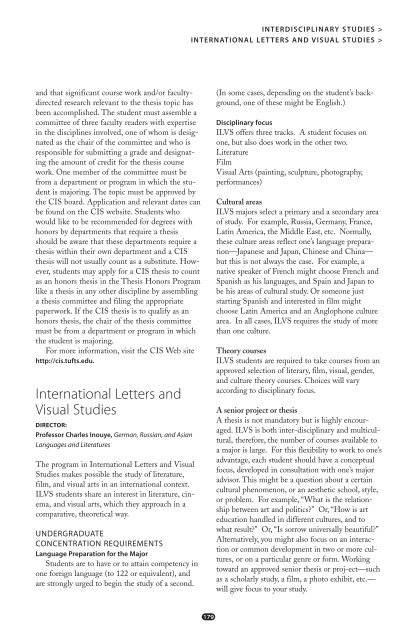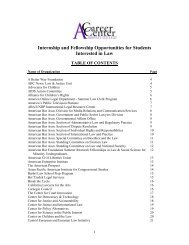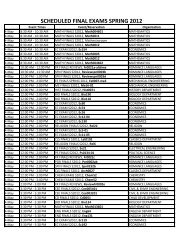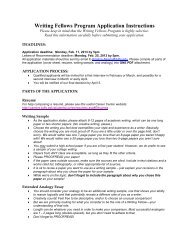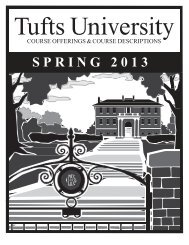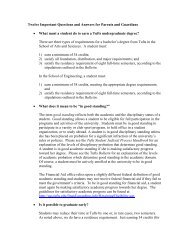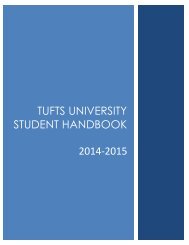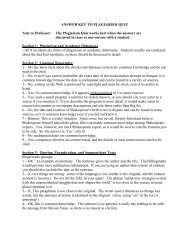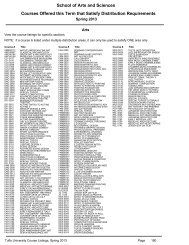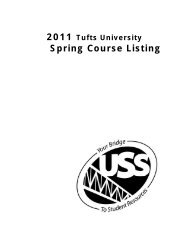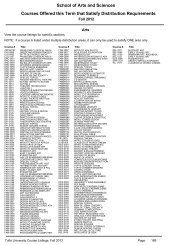The Bulletin - USS at Tufts - Tufts University
The Bulletin - USS at Tufts - Tufts University
The Bulletin - USS at Tufts - Tufts University
- No tags were found...
You also want an ePaper? Increase the reach of your titles
YUMPU automatically turns print PDFs into web optimized ePapers that Google loves.
INTERDISCIPLINARY STUDIES >INTERNATIONAL LETTERS AND VISUAL STUDIES >and th<strong>at</strong> significant course work and/or facultydirectedresearch relevant to the thesis topic hasbeen accomplished. <strong>The</strong> student must assemble acommittee of three faculty readers with expertisein the disciplines involved, one of whom is design<strong>at</strong>edas the chair of the committee and who isresponsible for submitting a grade and design<strong>at</strong>ingthe amount of credit for the thesis coursework. One member of the committee must befrom a department or program in which the studentis majoring. <strong>The</strong> topic must be approved bythe CIS board. Applic<strong>at</strong>ion and relevant d<strong>at</strong>es canbe found on the CIS website. Students whowould like to be recommended for degrees withhonors by departments th<strong>at</strong> require a thesisshould be aware th<strong>at</strong> these departments require <strong>at</strong>hesis within their own department and a CISthesis will not usually count as a substitute. However,students may apply for a CIS thesis to countas an honors thesis in the <strong>The</strong>sis Honors Programlike a thesis in any other discipline by assemblinga thesis committee and filing the appropri<strong>at</strong>epaperwork. If the CIS thesis is to qualify as anhonors thesis, the chair of the thesis committeemust be from a department or program in whichthe student is majoring.For more inform<strong>at</strong>ion, visit the CIS Web sitehttp://cis.tufts.edu.Intern<strong>at</strong>ional Letters andVisual StudiesDIRECTOR:Professor Charles Inouye, German, Russian, and AsianLanguages and Liter<strong>at</strong>ures<strong>The</strong> program in Intern<strong>at</strong>ional Letters and VisualStudies makes possible the study of liter<strong>at</strong>ure,film, and visual arts in an intern<strong>at</strong>ional context.ILVS students share an interest in liter<strong>at</strong>ure, cinema,and visual arts, which they approach in acompar<strong>at</strong>ive, theoretical way.UNDERGRADUATECONCENTRATION REQUIREMENTSLanguage Prepar<strong>at</strong>ion for the MajorStudents are to have or to <strong>at</strong>tain competency inone foreign language (to 122 or equivalent), andare strongly urged to begin the study of a second.(In some cases, depending on the student’s background,one of these might be English.)Disciplinary focusILVS offers three tracks. A student focuses onone, but also does work in the other two.Liter<strong>at</strong>ureFilmVisual Arts (painting, sculpture, photography,performances)Cultural areasILVS majors select a primary and a secondary areaof study. For example, Russia, Germany, France,L<strong>at</strong>in America, the Middle East, etc. Normally,these culture areas reflect one’s language prepar<strong>at</strong>ion—Japaneseand Japan, Chinese and China—but this is not always the case. For example, an<strong>at</strong>ive speaker of French might choose French andSpanish as his languages, and Spain and Japan tobe his areas of cultural study. Or someone juststarting Spanish and interested in film mightchoose L<strong>at</strong>in America and an Anglophone culturearea. In all cases, ILVS requires the study of morethan one culture.<strong>The</strong>ory coursesILVS students are required to take courses from anapproved selection of literary, film, visual, gender,and culture theory courses. Choices will varyaccording to disciplinary focus.A senior project or thesisA thesis is not mand<strong>at</strong>ory but is highly encouraged.ILVS is both inter-disciplinary and multicultural,therefore, the number of courses available toa major is large. For this flexibility to work to one’sadvantage, each student should have a conceptualfocus, developed in consult<strong>at</strong>ion with one’s majoradvisor. This might be a question about a certaincultural phenomenon, or an aesthetic school, style,or problem. For example, “Wh<strong>at</strong> is the rel<strong>at</strong>ionshipbetween art and politics?” Or, “How is arteduc<strong>at</strong>ion handled in different cultures, and towh<strong>at</strong> result?” Or, “Is sorrow universally beautiful?”Altern<strong>at</strong>ively, you might also focus on an interactionor common development in two or more cultures,or on a particular genre or form. Workingtoward an approved senior thesis or proj-ect—suchas a scholarly study, a film, a photo exhibit, etc.—will give focus to your study.179


